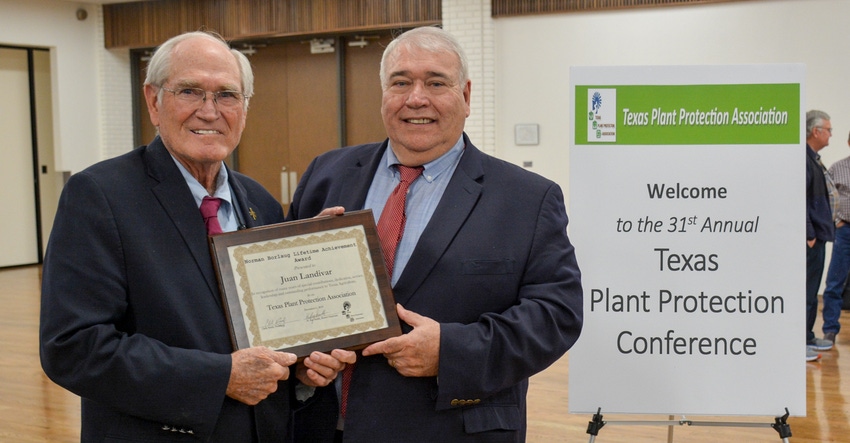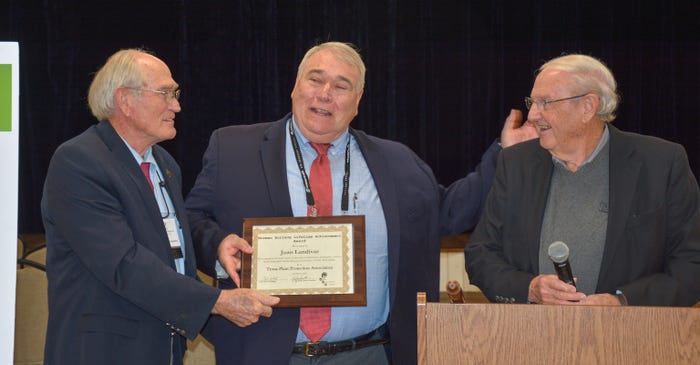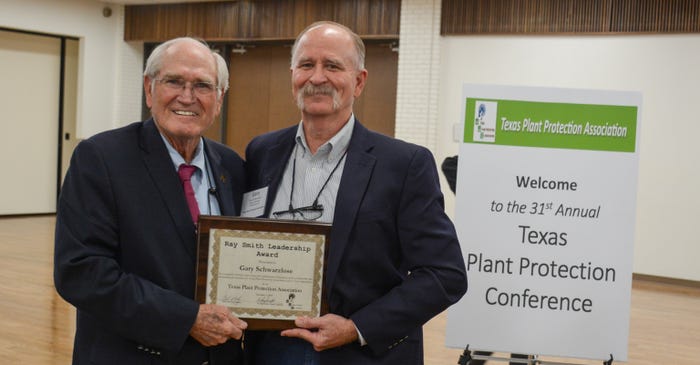
Juan Landivar, resident director, Texas A&M AgriLife Research and Extension Center, Corpus Christi, received the 2019 Norman Borlaug Lifetime Achievement Award from the Texas Plant Protection Association.
Landivar, who has led work on mode of action and uses of plant growth regulators and the development of remote sensing systems for research and precision management, received TPPA's highest honor at the association's 31st annual conference in Bryan.
The Norman Borlaug Lifetime Achievement Award is given to members who, over the years, have made a special contribution to the association, the conference and to Texas agriculture.
See, Smart machines make instant management decisions
Landivar, who is also responsible for the development of UA- based platforms for high throughput phenotyping, has been a member and a presenter at the annual conference since the early 1990s.
"Receiving an award honoring the life and accomplishments of Norman Borlaug is a tremendous honor," Landivar says. "Norman Borlaug has been a role model for me for a long time. He makes me proud to be an agronomist. Not only was he a great agronomist but also a tremendous person."
Norman Borlaug was also a humanitarian and Nobel laureate, often called the "Father of the Green Revolution," and "Agriculture's greatest Spokesperson," and "The Man Who Saved a Billion Lives." Borlaug completed his career as a member of the Texas A&M University staff, serving as a distinguished professor of International Agriculture.
"His contributions to agriculture were tremendous," Landivar adds.

"Dr. Landivar is very supportive and encourages his staff to be involved in TPPA by attending the conference and serving in leadership roles," said TPPA board member Ron Lacewell, as he presented Landivar his award.
Throughout his career, Landivar says the TPPA conference has been a roadway to producers. "As a researcher, most of the year you're in your small plots, and then you focus on analyzing the results and trying to interpret the data. The next step is how do we make that data useful to producers. This is one of the avenues, having a growers' audience, where you can come and say, 'This is what I found out and this is what it means to you.'"
Landivar, who has been an agronomist since 1976, says working for Texas A&M was a "pie in the sky dream." In 1988, on the brink of taking a faculty position at another university, Landivar received a letter from Texas A&M asking him to apply for a position. He interviewed and accepted a position at the Texas A&M AgriLife Extension and Research Center in Corpus Christi, where he has served for the last 31 years.
See, Microsoft offers AI for agriculture
"Making the decision to become a Texas A&M scientist was probably one of the best decisions of my life," he says.
Looking back over his career and at the changes that have taken place, he says this year's conference is a "good display of how much we've evolved.
"From trying to work in fields, where maybe out of 100 acres, you take several samples – in this corner and that corner. And then, based on that information, we would make management decisions. Now, with the UAV and artificial intelligence, we have the capabilities to take measurements from anywhere in the field. An acreage is 43,560 feet. We've got the potential to take 43,560 measurements out of an acre. You're not sampling anymore. You're getting the whole thing.
"And with that, we're able to better account for the variability of the field and make much better decisions."
This information is also known as big data. "And that's what we were talking about at this conference. How do you analyze big data? With the artificial intelligence expert systems."
Since his days as a graduate student, Landivar says he has one regret. He wishes he was younger.
"I'm 65," he admits. "I wish I was your age right now with where these technologies are. Of course, I still have a few years to go, but the technological advances, especially in the last 15 years, are tremendous. I believe in the next five years, we're going to see many amazing things on the farm."
Leadership Award
TPPA also presents the Ray Smith Leadership Award. The 2019 recipient is Gary Schwarzlose, Bayer Crop Science senior technical service rep for Texas.
"He has been a leader for several years in TPPA, serving on the board and as an officer," Lacewell says. Schwarzlose has served in TPPA leadership as poster chair, vice president, program chair and as president in 2017.
"When he served in these roles, he was successful in increasing the number of posters entered by students and in increasing attendance at the conference. He has been helpful to those who have followed him in those roles," Lacewell adds.

The Ray Smith Leadership Award, named after the TPPA founder, who still serves as chair, is given to a member who displays outstanding leadership in Texas agriculture and within TPPA.
"I not only have known Ray through this organization but as friendly competitors in the field," Schwarzlose says. "In the industry, Ray is one of those individuals who everybody looks to accomplish a lot of goals and works with graduates, undergraduates and the farmers. And knowing what he's done, and I'm being awarded for that, is certainly an honor."
See, AI will improve on-farm decision-making
PPA also presented four other awards:
Academic/Agency Award- David Kerns, professor, Texas A&M AgriLife Extension specialist, statewide IPM coordinator & associate department head
Industry Award- Steve Carlson, field agronomist for Bayer Crop Science in Central Texas
Consultant Award- Justin Chopelas, crop consultant in the Coastal Bend area of Texas
Graduate Student Award (Ph.D.) to James Griffin
Graduate Student Award (MS) - Cynthia Sias
The 2020 conference is scheduled for Dec. 8-9 in Bryan at the Brazos Center.
About the Author(s)
You May Also Like






